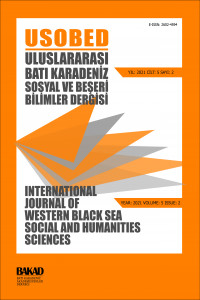Abstract
In the history of Turkish literature of the Republican period, poets who realize the value of Mevlâna are not few. When storytellers, novelists, theater actors and essayists are added, the number will increase even more. After the constitution of Republic of Turkish, the place of Mevlâna in the Turkish literature has not yet been researched about literary genres. The subject remains like a virgin field and awaits researchers who will be interested in master's and doctoral levels. The first concept to come to the fore in these studies will be “tradition”. Considering the revolution poetry, revolutionary poetry and tradition poetry, which found their expression in the first half of the Turkish poetry of the Republican period, it can be guessed that the poets who see Mevlâna and his Mesnevi as a source are mainly clustered in the third group. In the theoretical writings of some great poets who grew up in this period, a distinctive feature of poetry was “continuity”. “Continuity” finds its expression in the poetry of the tradition that connects the past, state and future. It is obvious that a poetic language based on tradition will not neglect the sources of the past. As an example of continuity in poetry, this article focuses on how Mevlâna developes today's poetry as a source, despite the centuries since his death.
References
- Asya, A. N. (1999). Bir Bayrak Rüzgâr Bekliyor. İstanbul: Ötüken.
- Ayvazoğlu, Beşir. (1997). Şiirler. İstanbul: Ötüken.
- Çelebi, A.H. (1983). Om Mani Padme Hum. İstanbul: Adam.
- Defne, Z. Ö. (1972). Mevlânâ İle. Türk Edebiyatı, (Cilt.1), 12. 6.
- Doğan, M. N. (Haz.) (2002). Hüsn ü Aşk, Metin, Nesre Çeviri, Notlar ve Açıklamalar. İstanbul: Ötüken.
- Gencer, B. (2014). İslam’da Modernleşme (1839-1939). İstanbul: Doğu Batı.
- Gölpınarlı, A. (1976). Divan Edebiyatı Müzesinin Tarihçesi ve Divan Şiirinden Günümüze Kalanlar, Milliyet Sanat Dergisi, 165, 12-15.
- Gürel, Z. (1988). Halide Nusret Zorlutuna. Ankara: Kültür ve Turizm Bakanlığı.
- Karakoç, S. (1982). Hızırla Kırk Saat. İstanbul: Diriliş.
- Mevlâna Celâleddin-i Rûmî (1995). Mesnevî. (Cilt. 5). Abdülbaki Gölpınarlı (Haz.). İstanbul: MEB.
- Oflazoğlu, T. (1986). Sevgi Hakanı. İstanbul: Dergâh.
- Oğuzcan, Ü.Y. (1971). Aşık Veysel Şatıroğlu Dostlar Beni Hatırlasın. İstanbul: Türkiye İş Bankası.
- Okay. M.O. (1990). Sanat ve Edebiyat Yazıları. İstanbul: Dergâh.
- Önder, M. (1990). Mevlâna’dan Güldeste. Ankara: Kültür Bakanlığı
- Önder, M. (t.y.). Mevlâna Şiir Antolojisi. Ankara: Ajans-Türk Kültür.
- Özgül, K. (1987). Halit Fahri Ozansoy, Hayatı ve Eserleri. İstanbul: Kültür ve Turizm Bakanlığı.
- Pala, İskender. (1998). Baki. İstanbul: Timaş.
- Şengüler, İ.H. (Haz.). (1990). Açıklamalı Mehmed Akif Külliyatı. İstanbul: Hikmet.
- Tanpınar, A. H. (2001). Yahya Kemal. İstanbul: Dergâh.
- Tanpınar, A. H. (2014). Huzur. İstanbul: Dergâh.
- Yavuz, H. (1989). Erguvan Sözler. İstanbul: Can.
- Yavuz, H. (1999). Yazın, Dil ve Sanat. İstanbul: Boyut.
- Yetiş, K. (Ed.). (2000). Eski Şiirin Rüzgârıyla. İstanbul: Fetih Cemiyeti.
- Zaehner, R.C. (2016). Hindu and Muslim Mysticism. London: Bloomsbury Academic Collections.
Abstract
Cumhuriyet dönemi Türk edebiyatı tarihinde Mevlâna’nın değerini idrak eden şairler az değildir. Hikayeci, romancı, tiyatrocu, denemeciler de bunlara eklenince sayı daha da çoğalacaktır. Bu yönüyle Cumhuriyetin kuruluşundan sonra gelişen Türk edebiyatında Mevlâna’nın yeri, edebi türler bağlamında henüz araştırılmış değildir. Konu şu hâlde bakir bir saha gibi durmakta ve yüksek lisans, doktora seviyesinde ilgilenecek araştırmacıları beklemektedir. Bu araştırmalar içinde öne çıkacak ilk kavram “gelenek” olacaktır. Cumhuriyet dönemi Türk şiirinin ilk yarısında ağırlıklı olarak ifadesini bulan inkılap şiiri, inkılapçı şiir ve gelenek şiirine bakıldığında Mevlâna ve Mesnevi’sini kaynak olarak gören şairlerin üçüncü grupta ağırlıklı olarak kümelendiği tahmin edilebilir. Bu dönemde yetişen kimi büyük şairlerin teorik yazılarında şiirin ayırt edici bir vasfı “süreklilik” olmuştur. “Süreklilik” geçmiş, hal ve geleceği birbirine bağlayan geleneğin şiirinde ifadesini bulur. Geleneğe yaslanan bir şiir dilinin geçmişin kaynaklarını ihmal etmeyeceği de aşikardır. Bu yazı şiirde sürekliliğin bir örneği olarak, vefatı üzerinden asırlar geçmesine rağmen Mevlana’nın günümüz şiirini bir kaynak olarak nasıl beslediğine odaklanmaktadır.
References
- Asya, A. N. (1999). Bir Bayrak Rüzgâr Bekliyor. İstanbul: Ötüken.
- Ayvazoğlu, Beşir. (1997). Şiirler. İstanbul: Ötüken.
- Çelebi, A.H. (1983). Om Mani Padme Hum. İstanbul: Adam.
- Defne, Z. Ö. (1972). Mevlânâ İle. Türk Edebiyatı, (Cilt.1), 12. 6.
- Doğan, M. N. (Haz.) (2002). Hüsn ü Aşk, Metin, Nesre Çeviri, Notlar ve Açıklamalar. İstanbul: Ötüken.
- Gencer, B. (2014). İslam’da Modernleşme (1839-1939). İstanbul: Doğu Batı.
- Gölpınarlı, A. (1976). Divan Edebiyatı Müzesinin Tarihçesi ve Divan Şiirinden Günümüze Kalanlar, Milliyet Sanat Dergisi, 165, 12-15.
- Gürel, Z. (1988). Halide Nusret Zorlutuna. Ankara: Kültür ve Turizm Bakanlığı.
- Karakoç, S. (1982). Hızırla Kırk Saat. İstanbul: Diriliş.
- Mevlâna Celâleddin-i Rûmî (1995). Mesnevî. (Cilt. 5). Abdülbaki Gölpınarlı (Haz.). İstanbul: MEB.
- Oflazoğlu, T. (1986). Sevgi Hakanı. İstanbul: Dergâh.
- Oğuzcan, Ü.Y. (1971). Aşık Veysel Şatıroğlu Dostlar Beni Hatırlasın. İstanbul: Türkiye İş Bankası.
- Okay. M.O. (1990). Sanat ve Edebiyat Yazıları. İstanbul: Dergâh.
- Önder, M. (1990). Mevlâna’dan Güldeste. Ankara: Kültür Bakanlığı
- Önder, M. (t.y.). Mevlâna Şiir Antolojisi. Ankara: Ajans-Türk Kültür.
- Özgül, K. (1987). Halit Fahri Ozansoy, Hayatı ve Eserleri. İstanbul: Kültür ve Turizm Bakanlığı.
- Pala, İskender. (1998). Baki. İstanbul: Timaş.
- Şengüler, İ.H. (Haz.). (1990). Açıklamalı Mehmed Akif Külliyatı. İstanbul: Hikmet.
- Tanpınar, A. H. (2001). Yahya Kemal. İstanbul: Dergâh.
- Tanpınar, A. H. (2014). Huzur. İstanbul: Dergâh.
- Yavuz, H. (1989). Erguvan Sözler. İstanbul: Can.
- Yavuz, H. (1999). Yazın, Dil ve Sanat. İstanbul: Boyut.
- Yetiş, K. (Ed.). (2000). Eski Şiirin Rüzgârıyla. İstanbul: Fetih Cemiyeti.
- Zaehner, R.C. (2016). Hindu and Muslim Mysticism. London: Bloomsbury Academic Collections.
Details
| Primary Language | Turkish |
|---|---|
| Subjects | Creative Arts and Writing |
| Journal Section | Research Article |
| Authors | |
| Publication Date | December 31, 2021 |
| Submission Date | November 2, 2021 |
| Acceptance Date | November 11, 2021 |
| Published in Issue | Year 2021 Volume: 5 Issue: 2 |
Cited By
KONYALI ACZÎ’YE AİT BİR NAʻT-I MEVLÂNÂ
Osmanli Mirasi Arastirmalari Dergisi
https://doi.org/10.17822/omad.1458214
All articles sent to the journal are checked by the plagiarism program before the evaluation process.
USOBED works under Creative Commons Attribution-NonCommercial-ShareAlike 4.0 International (CC BY-NC-SA 4.0). https://creativecommons.org/licenses/by-nc-sa/4.0/



